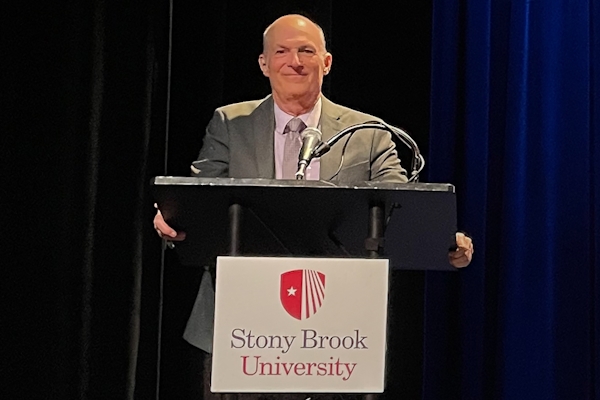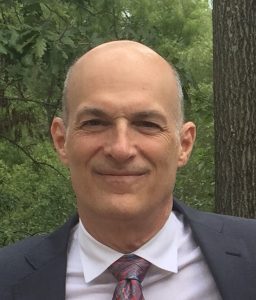John Budin (MS, 1981)

An alumnus of Stony Brook University’s School of Marine and Atmospheric Sciences (SoMAS), John Budin ’81, MD says he internalized his mental health struggles for years and avoided seeking care due to the stigma of being a doctor with bipolar disorder.
Budin recently returned to his alma mater as part of the Provost’s Lecture Series, telling students, faculty and fellow alumni how, after years of locking away his feelings, he realized his health, safety, marriage and career were at risk.
The alumnus recognized that he couldn’t keep the bipolar closet door shut forever. He eventually sought treatment from a psychiatrist, which he describes as the most humbling experience of his whole mental health journey.
Today, as both a psychiatrist himself and a person living with a brain disorder, Budin focuses much of his time on destigmatizing mental health disorders, particularly within the medical community. He hopes that by sharing his story, individuals who are struggling with mental health challenges will feel more comfortable seeking help.
How did it feel to be back at Stony Brook?
It felt great. It was my first time back on the Stony Brook campus since 1981. I did recognize some of the buildings, but there was an entirely new community, including the Charles B. Wang Center, where I spoke, which was beautiful. It felt like I was being transported to a place long ago where I had really fun memories.
You studied marine environmental sciences at Stony Brook before becoming a psychiatrist. What role, if any, did Stony Brook play in your career path? What inspired you to pursue a career in psychiatry?
I loved science, and being part of the marine sciences research program at Stony Brook allowed me to practice science in ways I had never done before. I have always loved to wonder how things tick and what makes them work. I also loved to do experiments and be in the lab. The idea of curiosity and wanting to know things that persisted at Stony Brook resonated well with me. Going into medicine didn’t feel like a big leap because it’s so scientific-based. And I think I found a profession in psychiatry where I’m constantly asking myself how people tick.
You talked about locking your bipolar disorder in a closet. What were the fears you had, both professionally and personally, that made you feel you had to hide your diagnosis?
From a personal perspective, I was afraid that if my bipolar disorder became known,
my friends and family would see me in a very different light. That I would be judged.
We still have many stigmas against those with mental health conditions, and that really
worried me. But the reality is that those judgments were coming from my own head.
As it turned out, my family and friends were very accepting and affirming.
Aside from the personal piece, my greater concern was the professional one. I was concerned that I would lose my license to practice medicine and that my colleagues would judge me not just for having bipolar disorder but also for having the temerity to talk about it. Again, none of those fears have come true. Perhaps I’ve been lucky, but I haven’t suffered any professional consequences. It’s been quite the opposite. My colleagues have been open, warm, welcoming, and grateful. They are also thankful I can speak about what is happening because so many suffer in silence.
How long did you struggle with your bipolar disorder before seeking treatment?
Far too long. I lived with bipolar disorder for 20 years without getting treatment. Most people can’t do that with bipolar disorder. It becomes too intrusive in their lives. My condition was mild initially, but it gradually escalated in frequency and intensity over time to the point where I couldn’t contain it anymore. It affected my personal life in ways it hadn’t before.
During your lecture, you spoke about how, during a manic episode, you were sexually assaulted. This experience was part of the reason you eventually sought help. Can you talk more about that?
When certain things are perpetrated against men and women, like sexual assault, they can feel very ashamed. But if we can step forward and talk about it, we can put it in a place where it doesn’t own us. I think that’s helpful for me, and I hope it can help others.
After the assault, my life felt like it had become unmanageable. I put my health and safety on the line. My actions affected my relationships with family, friends, and my husband. I knew that what was transpiring wasn’t sustainable. I realized I had to seek treatment, or I would destroy my life.
I was the type of person who was reluctant to seek treatment for themselves; I didn’t embrace it from day one. But growth happens when we move into discomfort, and now I am really grateful for my treatment. I will never miss a dose of medicine or an appointment with my psychiatrist. I will never go back to the way things were.
What was the reaction of your colleagues, friends, and family? And how did they help you in your journey to get here?
I held a fundraiser at my home for the Depression and Bipolar Support Alliance, where I sit on the board of directors. I invited all my friends, many of whom did not know I had bipolar disorder, and I billed the event as a conversation about physician mental health. When I shared my story with the room, I was met with stunned silence. But what happened after that was just amazing. People approached me and told me about their own untold experiences. Their response has been very affirming since then. I’m lucky to have a great group of friends who support me. And now, as people share that they have an illness, I feel comfortable sharing that I have a mental health condition. There’s no reason for us to view it differently. I try to continue to come out of that mental health closet, and my friends have been great at helping me do that.
What advice would you give someone with mental health challenges about facing their biggest fears? What do they stand to gain from being as open with others as you are?
At some point in your life, you will find that nothing is more powerful and freeing than being authentic to who you are. For many years, I ran away from myself, but no matter how fast I ran, I couldn’t escape who I was. There’s something incredibly powerful about not running and saying, ‘OK, this is who I am.’
We need to understand that we are not flawed or defective but that these are the cards we have been dealt. We need to accept our human vulnerability. Once I accepted my humanness, I could walk forward. It’s important to remember that you are not alone if you are struggling. Do not underestimate the welcoming and affirming response you may receive by sharing your story with the people who matter in your life.
What can change society’s culture and mindset surrounding mental health disorders?
One of the wonderful things that I hear, not only in the medical community but also in our society at large, is that more and more people are coming out of that mental health closet. Policymakers, star athletes and celebrities are putting into words that they, too, have a mental health condition. And this helps move the ball forward. It’s encouraging that people have the strength to speak their truth.
The other part of the equation is that I don’t think it’s fair to place all of the responsibility for cultural change on the backs of people who have been unwell. I believe that everyone, including those who have never experienced a mental health condition, can play a part in making it easier for people to share their stories and feel less alone.
There is good reason to be incredibly hopeful. People have so many allies walking hand in hand with them — people like myself who have walked in their shoes and understand their story. There are many reasons to be hopeful these days.
So, how can someone be more supportive of their loved ones, friends, and colleagues struggling to accept and cope with their mental health disorders?
Anyone can help move that ball forward. Look around you. If you have people in your life right now who are going through or have gone through some sort of mental health condition, ask them questions in a very non-judgmental way. ‘How are you? How are you doing? I notice you don’t seem like your usual self lately. Is there anything I can do to help?’
While access to mental health services in our country can be really difficult, it shouldn’t be lost on the people we have learned so much from. We have treatments that work so beautifully. Thousands and thousands of people who have received treatment are living satisfying and wonderful lives, like me.
If anyone has any questions, comments or wants to share their story with John Budin, you can reach him here: physicianwithbipolar@gmail.com.
-Christine McGrath
Watch John Budin’s full lecture on YouTube.
